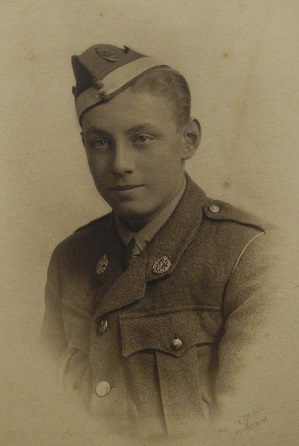
Harwood Woodwark Barton, of Whitby was killed in a flying accident on 2nd July, 1918, aged 17 years.
He attended Bootham School from 1915 to 1916. Harwood played football for the school second XI. He was a member of the school Natural History Society, joining the Microscopy section. The Eighty-Second Annual Report of Bootham School Natural History, Literary & Polytechnic Society January, 1916, (reported in the school magazine, “Bootham”, of March 1916) tells us that:
“Barton shows 30 micro-slides accompanied by a diary.”
He received a school prize for microscopy.
In the Bedroom Athletics Trophy tournament 1916 at school, Harwood did well, being the highest scorer in the Junior (under 15) section. Harwood nearly took the individual Athletics Junior Cup:
“The Junior Cup was won by Gillett ii, though the first places were equally shared by him with Nickalls and Barton.”
Harwood won the 880 Yards, and Hurdles, was second in High Jump and Gymnastics and third in 220 Yards.
In the summer of 1916, Harwood was playing cricket for the school. The October 1916 edition of “Bootham” reports on one of the matches:
“THE F.A.U., June 6, Home. Won, 105—82. With the exception of Moulsdale the first wickets fell for disappointingly small scores, but. Massingham and Barton saved the side, making 20 and 32 respectively.”
The notes on the team by the Captain include:
“BARTON, H. W.—A useful and capable bat, with a good forward reach, some power of scoring, and alertness never to miss a run. An extremely promising wicket-keep.”
The same issue of “Bootham” report the results of the Aquatics tournament. Harwood did well in this, coming second in many of the events (Open: 220 Yards, Plunge; Senior: 100 Yards, 25 Yards, and 25 Yards on Back). Overall he took second place in the Championship, as was awarded the Clayton Bronze Medal.
Harwood left Bootham School in 1916. He played cricket for the Old Scholars in the match against the school in May 1917.
The June 1917 issue of “Bootham”, in “Across the Months” reports that:
“H. W. BARTON is hoping to join the R.F.C.”
However the July 1918 issue of “Bootham” reports, under “Deaths”:
“BARTON.—On the 2nd July, 1918, killed whilst flying in England, Harwood W. Barton (1915-16), aged 18.”
The April 1919 issue of “Bootham” has his “In Memoriam” entry:
“HARWOOD WOODWARK BARTON (1915-16), Flight Cadet, R.A.F., was killed whilst flying on duty, July 2nd, 1918.
He came to Bootham after being five years at Ackworth, and early showed considerable independence of character, which seemed destined to make whatever career he embarked on a successful one ; and above all his personality was marked by a buoyancy of spirits and brightness of demeanour which won him friends on all sides.
Well might his CO. write: “His great characteristic of cheerfulness was a great asset in these days.”
Fired with ambition to take his part in the war, he entered the Flying Service very young. At school he had entered with zest into everything that took place, especially outdoor life, and when a cadet he was one of the prime movers in a large sports meeting, which, alas was fated to be held on the day when, with full military honours, his body was laid to rest at his home town.
It was not only on the playground that his interests were centred, for his keenness in learning every detail of his profession was noted, and at the aerodrome his instructors were agreed that he had in him the making of a first-class pilot.
Although devoid of fear, he did not take unnecessary risks, and it was all the more regrettable, therefore, that he should meet his death, soon after starting to fly alone, in one of those mishaps which are inseparably connected with an aviator’s career. R. K. S”
Flight Cadet Harwood Woodwark Barton is buried in his family vault at Whitby Cemetery.
